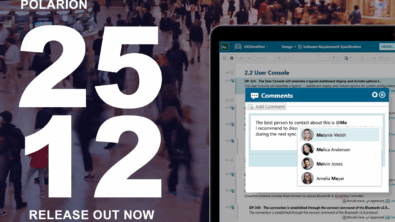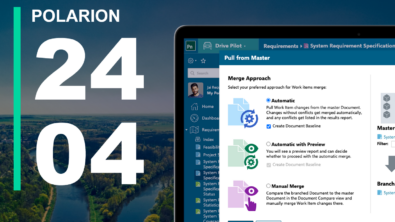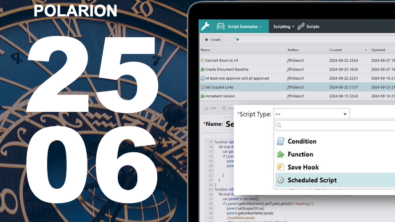Polarion ALM 2410 – What’s New and Noteworthy
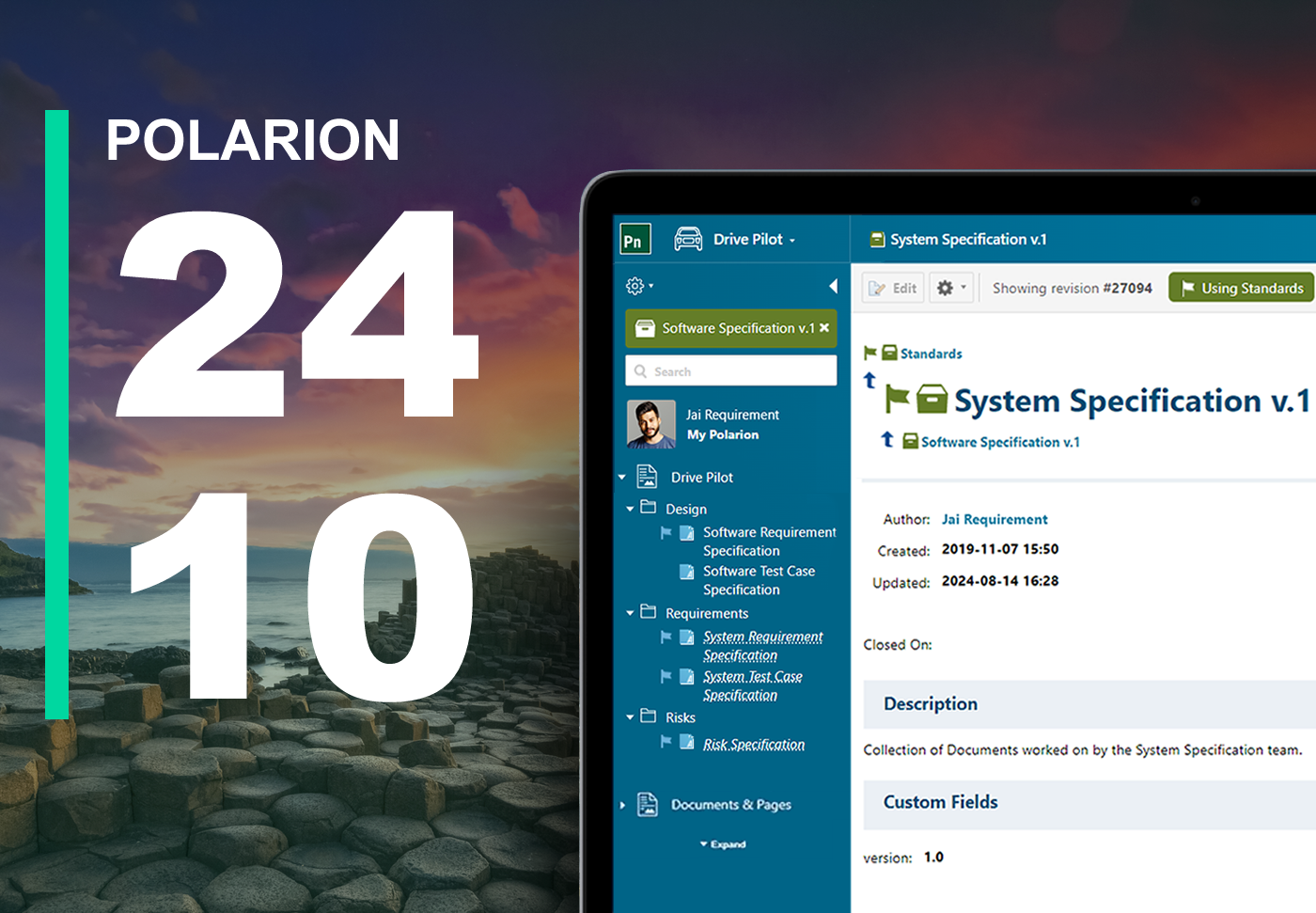
We are excited to present our latest release, Polarion 2410. At Polarion, our dedication to continuous improvement drives us to innovate and integrate user feedback into every update. Here’s a glimpse at what’s new:
- Collection Hierarchy – Simplify complex system development by allowing relationships between Collections.
- Polarion Scripting – Create secure save hook and workflow scripts directly from Polarion Administration to tailor your business process like never before.
- New Polarion Connector for Rhapsody – Integrate requirements traceability and coverage without switching applications.
Let’s explore in detail all the new features and improvements, and highlight the latest enhancements in security, performance, and quality included in this release.
Collection Hierarchy for complex system development
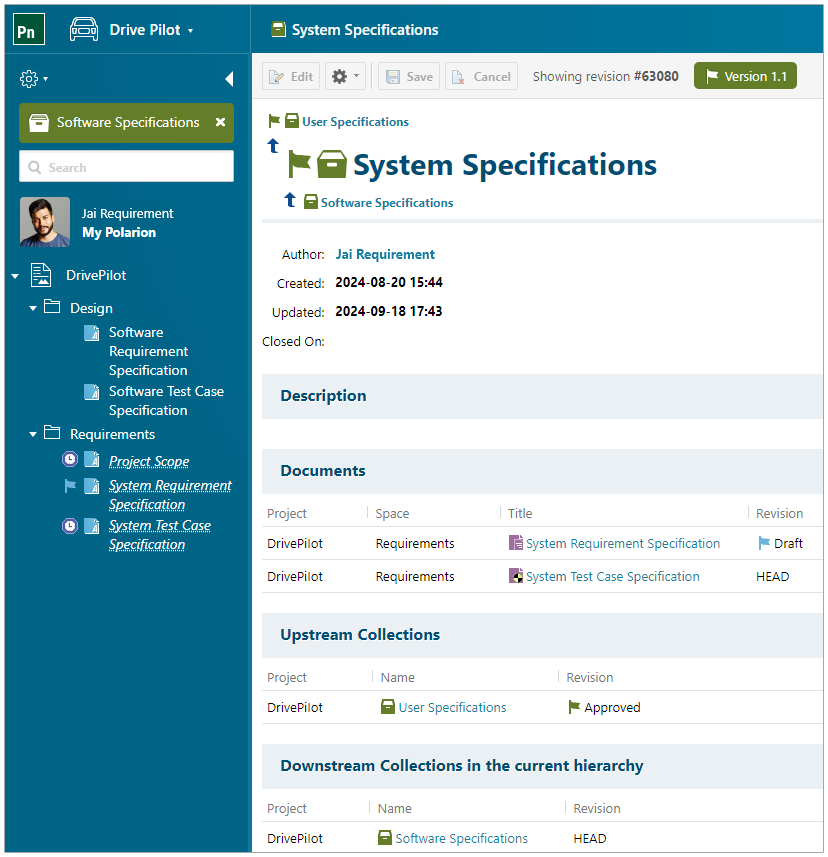
In Polarion 20 R1, we introduced Collections. They allow you to group Documents in specific revision states together. The entire Collection can then be browsed, worked on, and baselined.
Collections help you link Work Items between Documents at different revision points or baselines. This ability is essential in parallel development when an upstream Document may have already moved on to a later revision. It allows the downstream Document to create and maintain links to the earlier revision point.
The new Collection hierarchy capability introduced in 2410 further expands this concept. Now, you can create a special relationship between Collections, where a lower-level Collection is dependent on an Upstream Collection baseline. This allows Work Item links to exist not just between Documents in a single Collection, but also between Work Items across related Collections.
This is invaluable in complex system development, where teams work with large numbers of Documents in parallel. Each Collection can then represent a grouping of many Documents at a particular level of the V-model.
As lower-level Documents are developed, they depend upon the high-level upstream baselined Documents represented in their own Collection.
With Collection hierarchies, you can ensure that links between Work Items across Collections are created at the correct revision point.
Collection hierarchies also help if the upstream-dependent Collection ever needs to be replaced with a different baseline or revision point due to a design change.
Polarion does all the hard work and saves your team time by automatically re-linking existing Work Items to the new revisions.
The updated Collection form shows downstream relationships to lower-level dependent Collections.

Polarion calculates these lower-level relationships based on your current working Collection context since a Collection can exist in multiple hierarchal structures.
Related Collection enhancements
- We added an
 Enter Collection button to the updated Collection form to enter the selected Collection and take users to a new landing page with the appropriate context set and all relevant Documents visible in the left sidebar navigation pane.
Enter Collection button to the updated Collection form to enter the selected Collection and take users to a new landing page with the appropriate context set and all relevant Documents visible in the left sidebar navigation pane. - The navigation pane in a Collection context now includes any Documents related to the current Collection and those in an upstream Collection dependency.
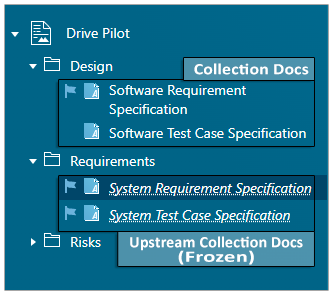
- Documents belonging to an Upstream Collection (italicized and underlined) and those already frozen (with a baseline flag or a clock icon) are easily identifiable. The other Documents are still editable in the Collection context.
- A new menu item lets you baseline Documents or the entire Collection without leaving the Collection context.
Introducing Polarion Scripting for process tailoring
Polarion Scripting now offers even greater flexibility, allowing users to automate and tailor business processes and workflow rules like never before. Creating, importing, and reusing scripts provides a new level of modularity, making it easier to extend Polarion’s functionality to meet specific business needs.
Whether you are automating repetitive tasks or implementing complex business logic, Polarion’s scripting capabilities will empower your teams to customize Polarion.
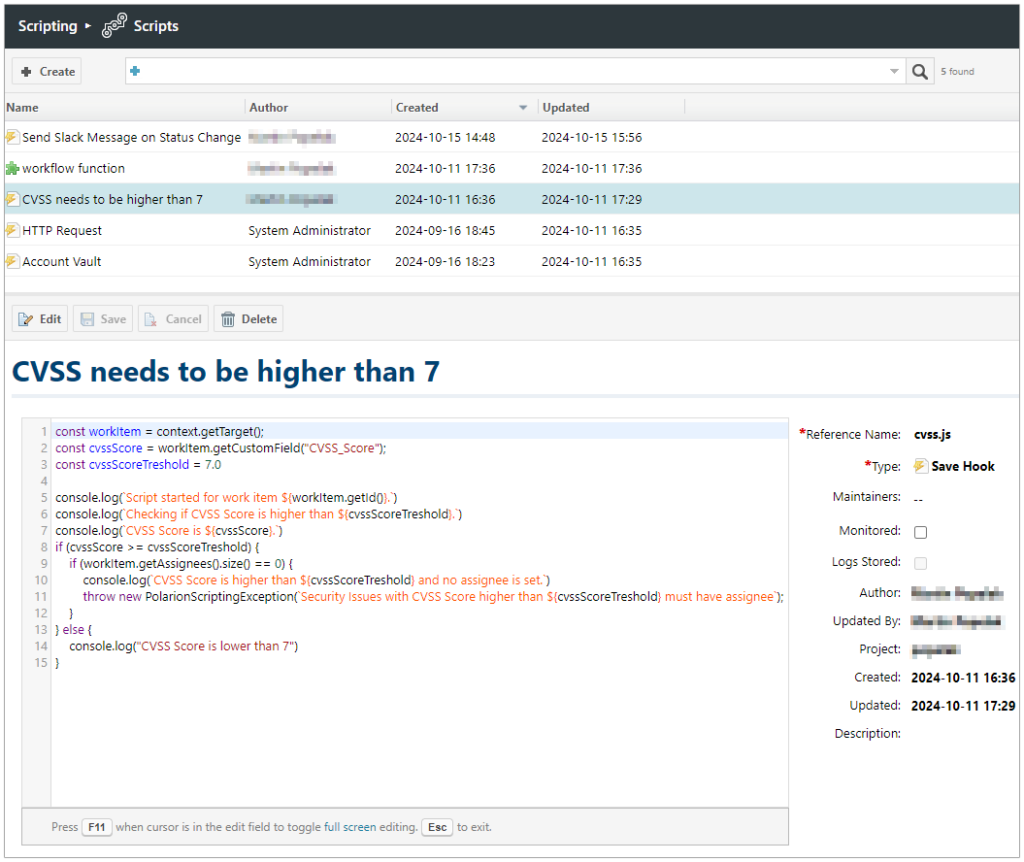
One of the most powerful additions is the introduction of Save Hooks, which now complement existing Workflow Conditions and Functions.
While conditions and functions allowed some workflow automation, writing and managing custom scripts was previously more cumbersome. With save hooks, you can trigger scripts automatically upon saving objects, such as Work Items or Documents, allowing greater control and efficiency. Save Hooks make it far easier to ensure that validation, data manipulation, and business rules are enforced during the save process without user intervention.
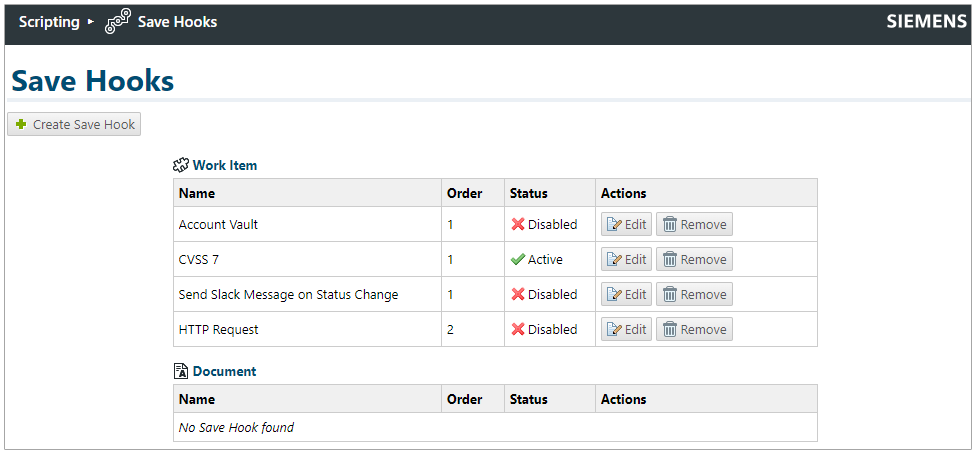
In previous Polarion releases, third-party extensions provided the Save Hook capability. With this release, you can begin converting your existing scripts with help from our Scripting SDK documentation and transition to our new scripting framework.
In 2410, we also simplified script management. You can author scripts directly from the Polarion Administration UI and monitor their execution through the new Script Monitor.
The Script Monitor allows teams to observe script performance, troubleshoot issues, and refine automation, making scripting not only more powerful but also more accessible and manageable than ever.
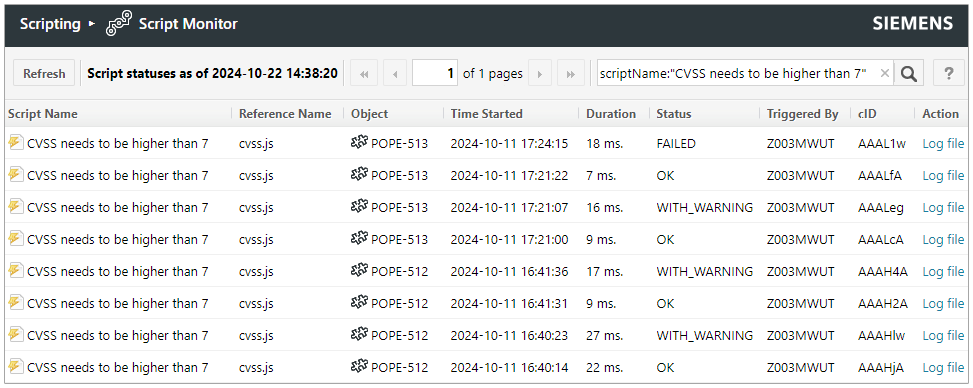
Type specific support for Test Case failure scenarios
The testing configuration, or more precisely, the Test Case Failure Configuration, can now be type-specific. That means the testing configuration is no longer limited to a single test case type. You can create specific configurations for different defect types created after a failure of, for example, a Software Test Case or a System Test Case, giving you higher flexibility and better control over your test management.

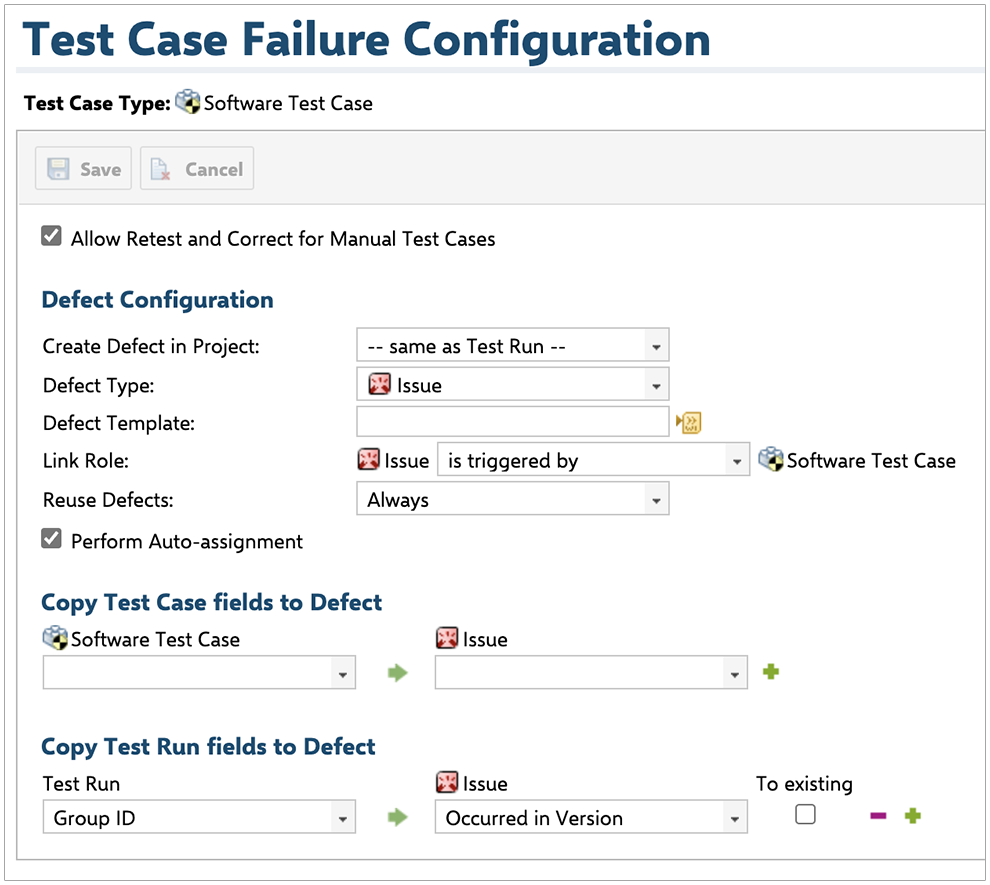
Strengthened our Integration Capabilities
Improved ReqIF/RIF Templates
We made it easier to map multiple documents while importing or exporting to ReqIF/RIF. Instead of loading a template for each document, you can now load one for an entire batch of documents.

Distribute ReqIF Documents to Different Projects in one go
ReqIF files can contain multiple documents, such as hardware and software specifications. In the ReqIF Import Wizard, you can now select one target project per ReqIF document. Polarion will import the documents to the selected target Projects. If links exist in the ReqIF document, Polarion will even create links across the target projects.
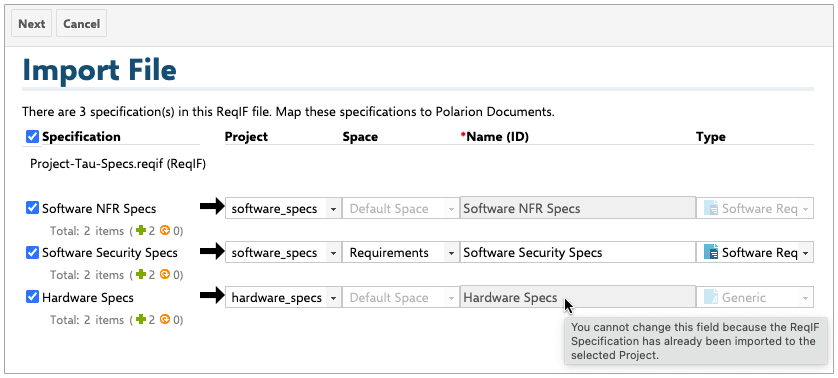
Improved ReqIF Compatibilities with IBM Doors
We have improved the editability of ReqIF files exported from Polarion and imported to IBM Doors. You can now choose an option in the UI to ensure that the custom fields of exported Polarion items are editable in IBM Doors.
Support for Cross References in ReqIF Roundtrip
In the last release, we added support for exporting Cross References to ReqIF. They are represented as standard HTML hyperlinks in ReqIF to ensure maximum compatibility. In this release, we introduced support for importing Cross References from ReqIF to Polarion so you can perform roundtrip use cases.
Extended Collection Support with REST API
Continuing the work on our best-in-class REST API, we extended it with full support for Collections. It includes REST API support for the new Upstream Collections feature introduced in this release.
For more detailed information and references, please consult our REST API reference documentation in the SDK folder and the REST API User Guide.
Customer Requested Enhancement to our Jira and Azure DevOps Integration
Driven by one of our most requested customer enhancements, we improved our Jira and Azure DevOps Connectors.
General:
- Multiple attachments added simultaneously are no longer created with the same ID, so all of our integrations correctly synchronize data between Polarion and a remote system.
Specifically for the Jira Connector:
- Polarion Label, Hyperlink, and URL type fields can now be synchronized with Jira.
- The Polarion Priority field can now be synchronized with a Jira custom field of type Float.
- It is now possible to configure the Connector to synchronize more than 50 fields at the same time.
Specifically for Azure DevOps Connector:
- Polarion multi-enumeration custom fields can now be synchronized with Azure DevOps fields plugged into Polarion using the Multivalue control plugin.
- The Polarion Priority field can now be can now be synchronized to the Azure DevOps Priority field both as float, or enumeration.
In the future, we plan to continue deepening our software factory integration by providing additional improvements to our Azure DevOps and Jira integrations. To do so effectively, please make sure that you report all your not-yet-available use cases to Support so your requests can be captured in our system. This will increase the priority of the tracked customer enhancement requests and push them into our development plan.
New Polarion Connector for IBM Rhapsody
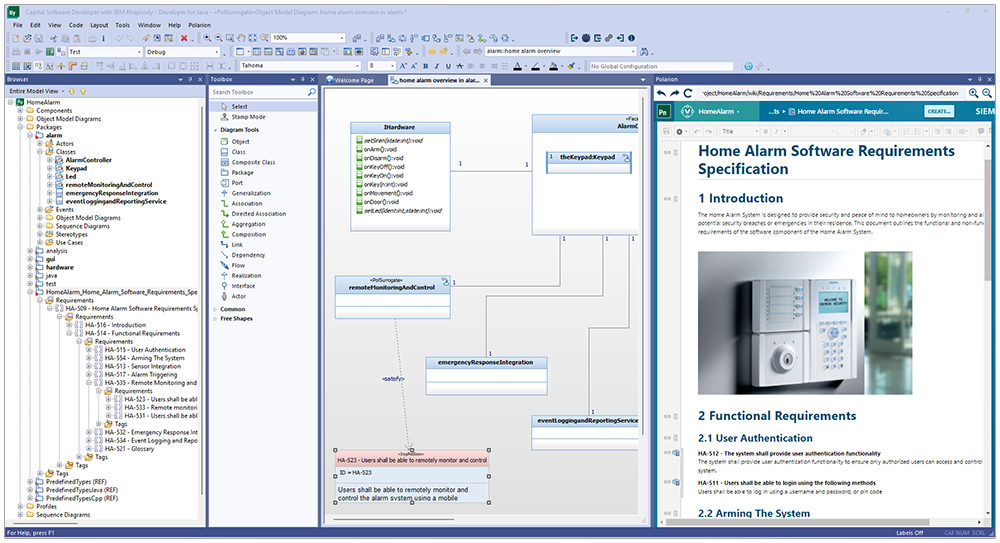
We are thrilled to announce the availability of a new Polarion Connector for IBM Rhapsody. This new integration is a plugin for IBM Rhapsody and focuses on requirements traceability and coverage.
Similar to the features of our popular Polarion Connector for MathWorks Simulink, we have embedded Polarion entirely within Rhapsody, avoiding the need to switch between applications and lose focus.
Through the integration, you can easily import Work Items into a Rhapsody model, create traceability links to model elements, and then propagate those links back to Polarion as surrogate model elements and link to the originating Work Items for coverage. When model elements are used in modeling diagrams, they can also be shown in Polarion to ensure readability.
You can easily navigate between both applications at any time. This new integration supports Polarion baselines, revisions, and changes to requirements and models.
If you don’t want to import Work Items into Rhapsody, you can directly link model elements to Polarion Work Items instead. The same backlink processing and propagation of those direct links to Polarion is available.
The integration offers a simple way to publish model elements to Polarion, letting YOU decide where to link those items within Polarion.
You can watch a short overview of the integration’s features on our Polarion YouTube page.
Usability enhancements
In the Elevated Experience stream, we addressed a total of 28 functional enhancements requested by our customers, closing almost 150 customer ERs!
We are working hard to close these small usability gaps and bring Polarion’s usability to the forefront of modern web-based applications. Here are some quality-of-life improvements you’ll see in 2410.
Hierarchical saved queries
We enhanced the saved queries for Work Items to simplify the search process. These saved queries can now reference other existing saved queries, allowing a project team to reuse query snippets prepared by a project administrator. (Allowing you to more centrally manage shared queries.)
Polarion now displays Saved Queries by name in a dedicated query bubble, making them easy to identify and use.
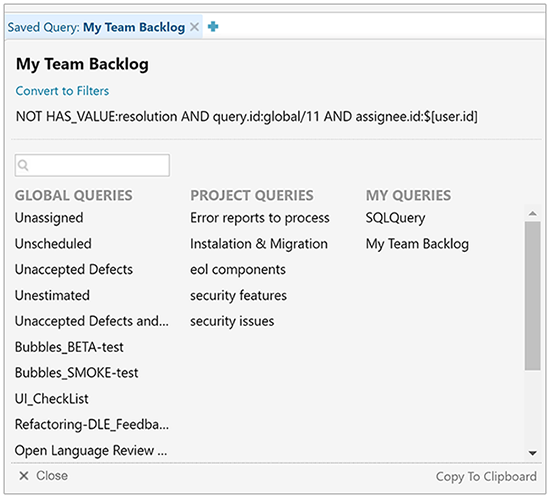
You can now edit existing saved queries in the Manage Saved Queries dialog. Queries are scrollable and filterable, making it easier than ever for Project and Global administrators to manage them.
We also added the following new attributes to saved queries:
- date of creation
- last update
- the name of the user who created it
- the user that made the last update
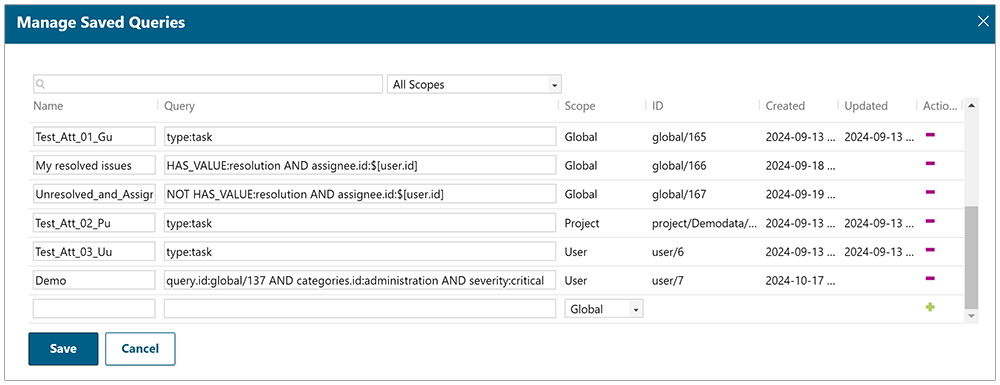
Right-click to update hyperlinks
You asked for it, so here you go! You can now right-click on a hyperlink or cross-reference to edit it, so you can easily update a link or its label without deleting it and creating a new one.
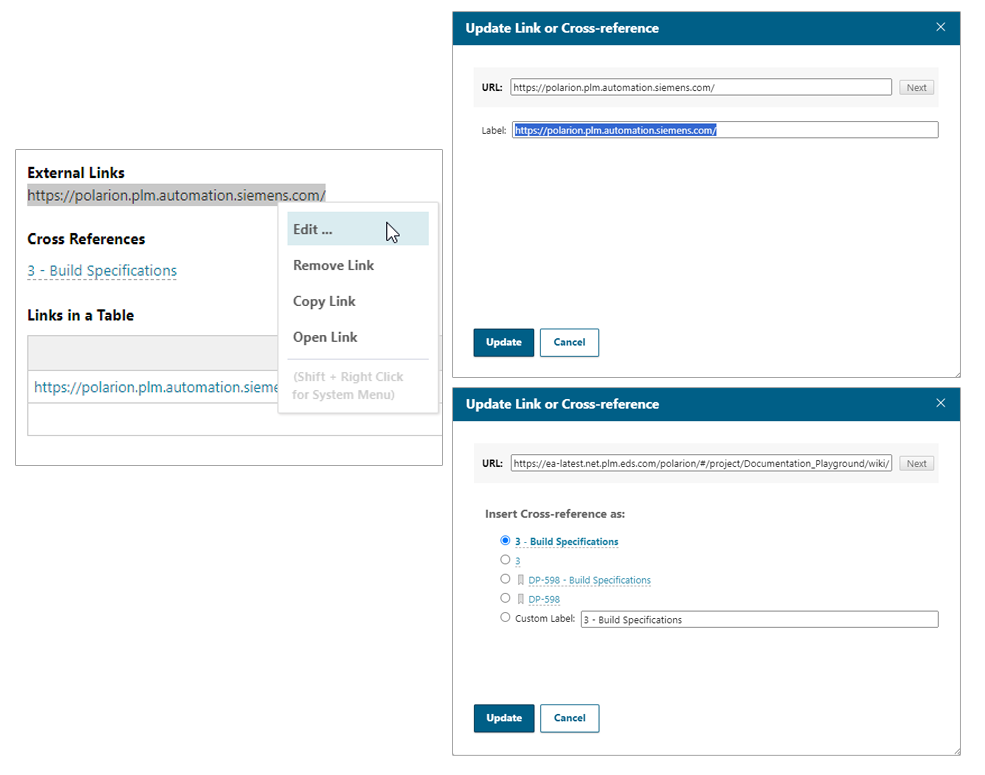
Drag and drop attachments
We also introduced a much-requested drag-and-drop feature for adding attachments to Polarion objects within Polarion LiveDocs. It supports selecting multiple objects at once.
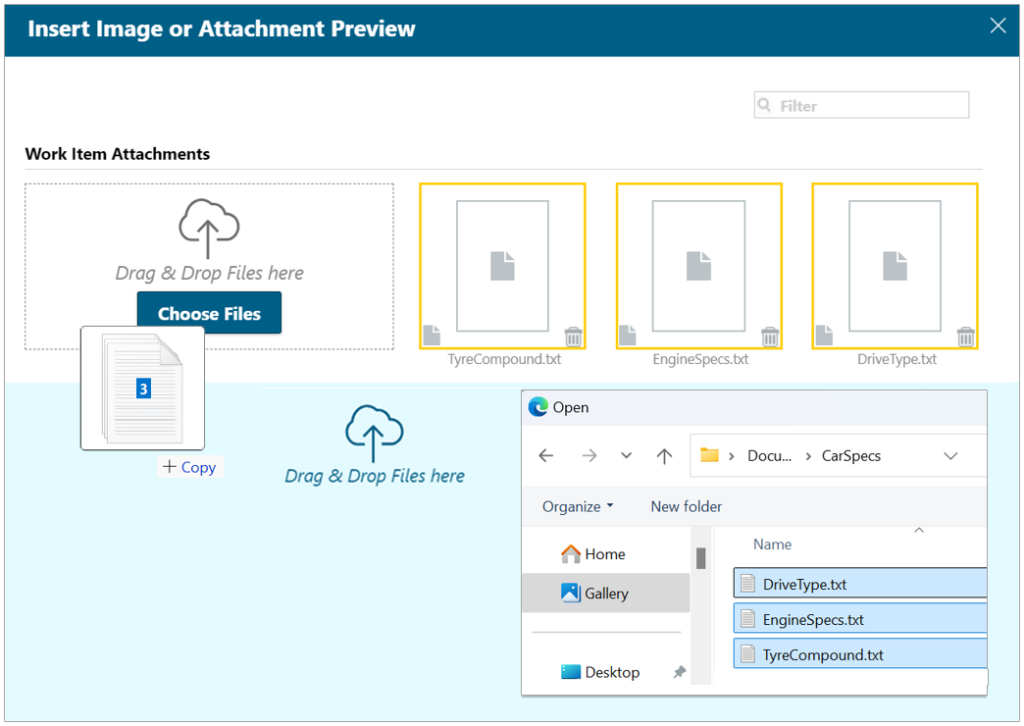
Updated the Help Homepage
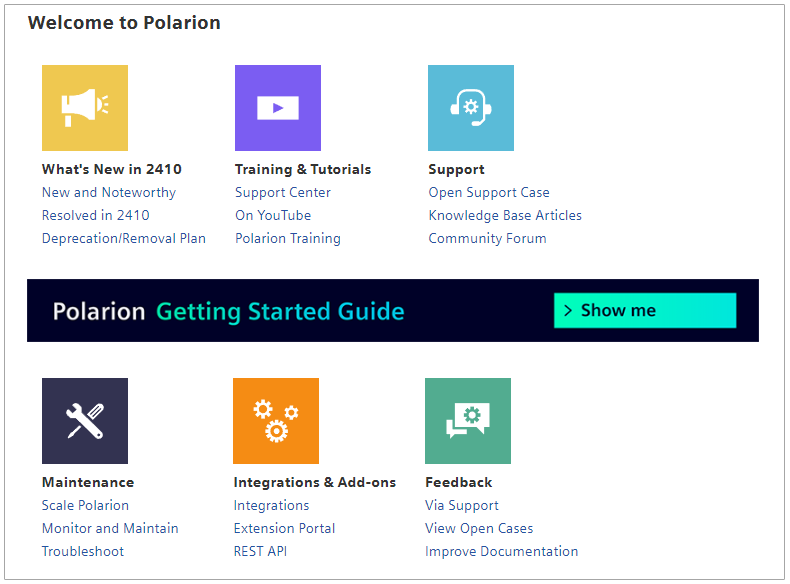
We also revamped our Help homepage to provide a one-stop shop for links to news, training material, forums, integrations, and Support.
Additional usability improvements
We understand the importance of usability in software. Even small improvements can make a big difference in your overall experience. With this release, we’ve continued our efforts to enhance usability by implementing several minor improvements across the application.
- Highlighting incomplete required fields was improved, making it much easier to identify what fields need attention. This is especially true for Work Items with numerous custom fields.

- Adjusted the link limiting behavior to allow the displayed links limit to only be applied to a specific link role. This lets you hide less critical links from the default view while keeping all the essentials.
- You can now pin the Work Item header, so it’s always visible when scrolling through a long Work Item.
- You can
 Watch Space Homepages and be alerted to any changes.
Watch Space Homepages and be alerted to any changes. - The header displays longer titles without trimming them.
- You can now double-click to zoom in on Test Record attachments like you can for rich text attachments.
- You can now assign Work Items to Plans using the Planned In field with QA, REQ, and PRO licenses.
Security updates
Manage Secrets with Hashicorp
With Polarion 2410 you can now store secrets used by Polarion in an external Hashicorp vault. This allows you to centralize the management of all secrets in a robust, best-in-class storage tool for sensitive data.
For more information on how to connect your Polarion instance to the Hashicorp vault, see our Help.
Adjusted access to Project-level configuration
As part of our enhancements that aim to simplify the lives of Polarion project administrators, we reworked the behavior of project-level permissions to provide three distinct sets of permissions for three main administrative scenarios:
- User management: Bound to the
USER MANAGEpermission, this level of administrative access allows administrators to manage Polarion users on the Global or Project-specific levels and assign them user roles. - Roles management: Bound to the
ROLE MANAGEpermission, this level of administrative access allows administrators to manage Global and Project roles and assign permissions and Subversion path-based authorization rules to these roles. - Process management: Bound to the
ADMINISTRATION MODIFYpermission, this level of administrative access allows administrators to manage anything other than users and roles, such as Workflows, Types, Custom Fields, Enumerations, etc.
We also more clearly distinguish between Global and Project roles when administering permissions to prevent possible mistakes that could result in granting project users access to broad global roles.
You can also restrict the assignment of Project-level permissions to global roles. This option is not enabled by default but can be enabled via a configuration property. See the Configure user Roles section in Help for details.
Improved logging for security audits
To allow security teams to monitor for potentially malicious user behavior, we enhanced Polarion logging so that it captures:
- Attempts to load restricted resources that they are not authorized to view.
- Failed login attempts are logged with a description explaining why the login failed.
Project-level result data filtering for SQL queries
In our 2404 release, we changed Apache Lucene query results to display only artifacts from Projects that a user has permission for. SQL results are now also processed to return data exclusively from accessible projects.
This new behavior is driven by the same property introduced in release 2404 for the Lucene index data and enabled by default.
To further strengthen security, we also implemented:
1) A cap to the LIMIT and OFFSET SQL commands
The LIMIT, OFFSET, and FETCH FIRST N ROWS ONLY SQL commands cannot be used for pagination or other purposes. This is because the returned batch sizes cannot guarantee if a query is using the appropriate project constraints in the WHERE clause. (A result is from a project the user shouldn’t view.)
2) Simple vs. complex SQL commands and additional disabled SQL commands
We introduced new restrictions on SQL commands to prevent information breaches via malicious queries. By default, the restrictions are only applied to complex SQL commands. (Those containing more than one SELECT statement, whether used in conjunction or nested within another command.)
You can deactivate this feature or apply it to all SQL commands. (May impact reports or extensions that use SQL.)
You can view properties added and removed in 2410 in our Polarion 2410 System Configuration Properties Reference Guide.
Performance and Scalability
Even though our dev team has some significant performance and scalability upgrades in the wings, they still delivered in 2410:
- Polarion startup was accelerated by roughly 20% for large deployments, allowing for shorter restarts and less downtime.
- Burndown and burnup charts for a Plan now render substantially faster the first time after the database queries were reworked to perform well on very large data sets with millions of plan records in the database.
- Leveraging a different parser in our backend significantly reduced memory consumption when adding JSON data to the database. The time it takes to compare documents was also decreased by about 14%.
- The Move Work Items dialog now lazy-loads Documents based on space selection, resulting in a much faster response and lower server load.
- Working with our enterprise customers, we investigated the rare occurrences when Cluster nodes display different query results and resolved several causes of this inconsistency in large-scale Polarion deployments.
- Query expanders are optimized to perform faster when they return a large number of results, their memory consumption is significantly reduced, and the limits for many terms are avoided.
- We enhanced the RPC log to cover the query panel’s frequent loading and gained better insight into this common scenario’s performance.
- We enhanced Polarion’s main logs with correlation IDs. These IDs group all log lines belonging to the same transaction, which helps administrators filter all relevant log lines for a specific user operation to simplify and accelerate log analysis.
SALT has become the default license option
Starting with Polarion 2404, we began to support the Siemens Advanced Licensing Technology (SALT) license manager alongside our old proprietary licensing method.
In 2410, SALT is now the default license manager.
See our SALT licensing guide for more information, and read the Version 2410 section of the 5_Required_Config_changes.txt file in the update package to ensure a smooth upgrade.
(Although the proprietary licensing method is scheduled for deprecation, you can still use it.)
Notable Issue Fixes
At Polarion, we’re committed to providing the best possible experience for our users. With every release, we tirelessly work to fix bugs, enhance performance, and improve the user interface. Whether you’re using Polarion on-premise or Polarion X in the cloud, we’re dedicated to ensuring your experience is smooth and seamless.
Explore the list of bug fixes, performance improvements, and enhancements we’ve delivered in Polarion 2410.
Deprecations
In our commitment to keeping Polarion current, we periodically evaluate and clean up outdated features and embrace new technologies. See our Deprecation and Removal Plan for details.
Update Information
Polarion 2410 is an update of Polarion ALM, available to all customers with a current maintenance subscription. This update is your gateway to the latest enhancements and security fixes. Staying up to date with our latest release ensures you benefit from new features, enhanced security, improved usability, and better performance.
To download the update distribution package, please visit this link.
For comprehensive details on the update process, read the the bundled 2_How_to_update_Polarion.txt file in the update package.
Conclusion
With Polarion 2410, we’re committed to providing you with the best possible experience. This release is packed with features designed to support your development workflow and ensure that Polarion is well integrated into your ecosystem.
We’re constantly listening to your feedback and working to incorporate it into our updates, ensuring that Polarion remains the leading choice for collaborative software development and project management.
If you have any questions or comments, please don’t hesitate to contact us via blog comments, the Polarion Community Portal, or your Polarion technical support contact.
Thank you for choosing Polarion. We hope you enjoy the new features and enhancements in this release. Stay tuned for more updates and improvements in the future!
Regards,
Jean-François Thibeault,
Polarion ALM Product Management
